Roofing Companies Bourton on the Water
Find Roofing Company in Bourton on the Water
Receive 3 FREE Roofing Service quotes for your project today! Compare profiles, reviews, accreditations, portfolio, etc... and choose the best offer.
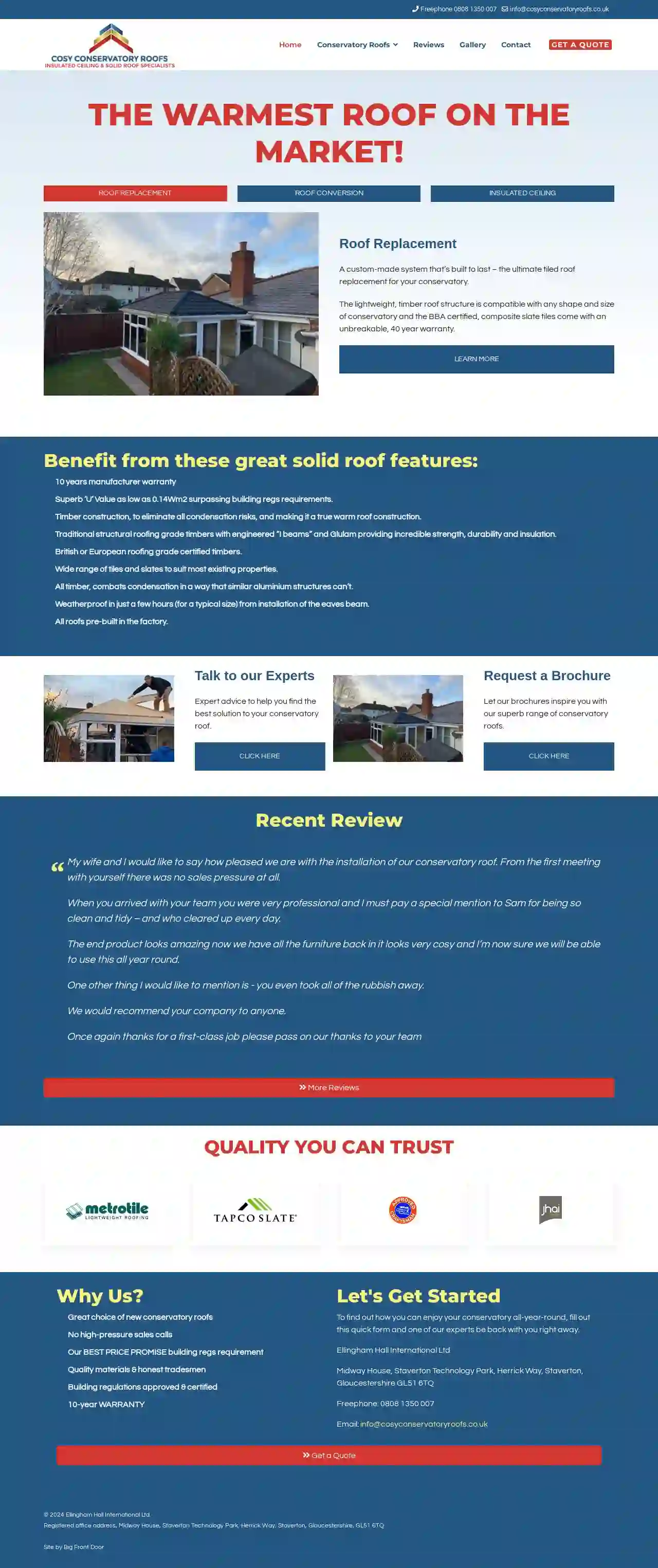
Cosy Conservatory Roofs 2020 Ltd
11 reviewsMidway House, Staverton Technology Park, Herrick Way, Staverton, GL51 6TQ, GBThe Warmest Roof On The Market! At Cosy Conservatory Roofs, we offer a range of high-quality conservatory roof replacement and conversion solutions designed to transform your conservatory into a comfortable and usable space year-round. Our lightweight, timber roof structures are compatible with any shape and size of conservatory, and our BBA certified, composite slate tiles come with an unbreakable, 40 year warranty. We understand that your conservatory is an important part of your home, and we're committed to providing you with a roof that is both stylish and durable. Our team of experienced professionals will work with you every step of the way to ensure that your new roof is installed to the highest standards. Benefit from these great solid roof features: * 10 years manufacturer warranty * Superb ‘U’ Value as low as 0.14Wm2 surpassing building regs requirements. * Timber construction, to eliminate all condensation risks, and making it a true warm roof construction. * Traditional structural roofing grade timbers with engineered “I beams” and Glulam providing incredible strength, durability and insulation. * British or European roofing grade certified timbers. * Wide range of tiles and slates to suit most existing properties. Contact us today to learn more about our conservatory roof replacement and conversion services.
- Services
- Why Us?
- Accreditations
- Our Team
- Testimonials
- Gallery
Get Quote
Roof Repairs Gloucester - Roofing & Repair Specialists
4.314 reviewsGBWelcome to B&S Roof Repairs Gloucester, we are a well-established Roofing Company with over 20 years experience in delivering unparalleled services. Our primary focus is to provide top-notch services at fair and competitive rates, and at B&S Roof Repairs we are always ready to provide expert guidance supported by the highest quality workmanship. If you’re looking for a certified Roofing Contractor in Gloucester or any area in Gloucestershire you can rely on B&S Roof Repairs Today. We Specialise in all aspects of Roofing Work including Chimney Replacement and Removal and Fascia's, Soffits & Guttering Installations. Some of the services we provide: New Roofs Roof Repairs Flat Roofs Tiling & Slating Ridge Tiles Chimney Repairs & Replacement UPVC Fascia's, Soffits & Guttering Moss Cleaning
- Services
- Why Us?
- Gallery
Get Quote
Q & M Limited
34 reviewsGloucester, GBQ & M are a well established hard metal and lead roofing and cladding contractor based in Gloucestershire.Our clients range from large construction companies to householders, in sectors covering commercial, private,education, health, retail, leisure and ecclesiastical.We have in the last 30 years built a solid reputation for in-depth knowledge of our craft and high quality workmanship.
- Services
- Why Us?
- Gallery
Get Quote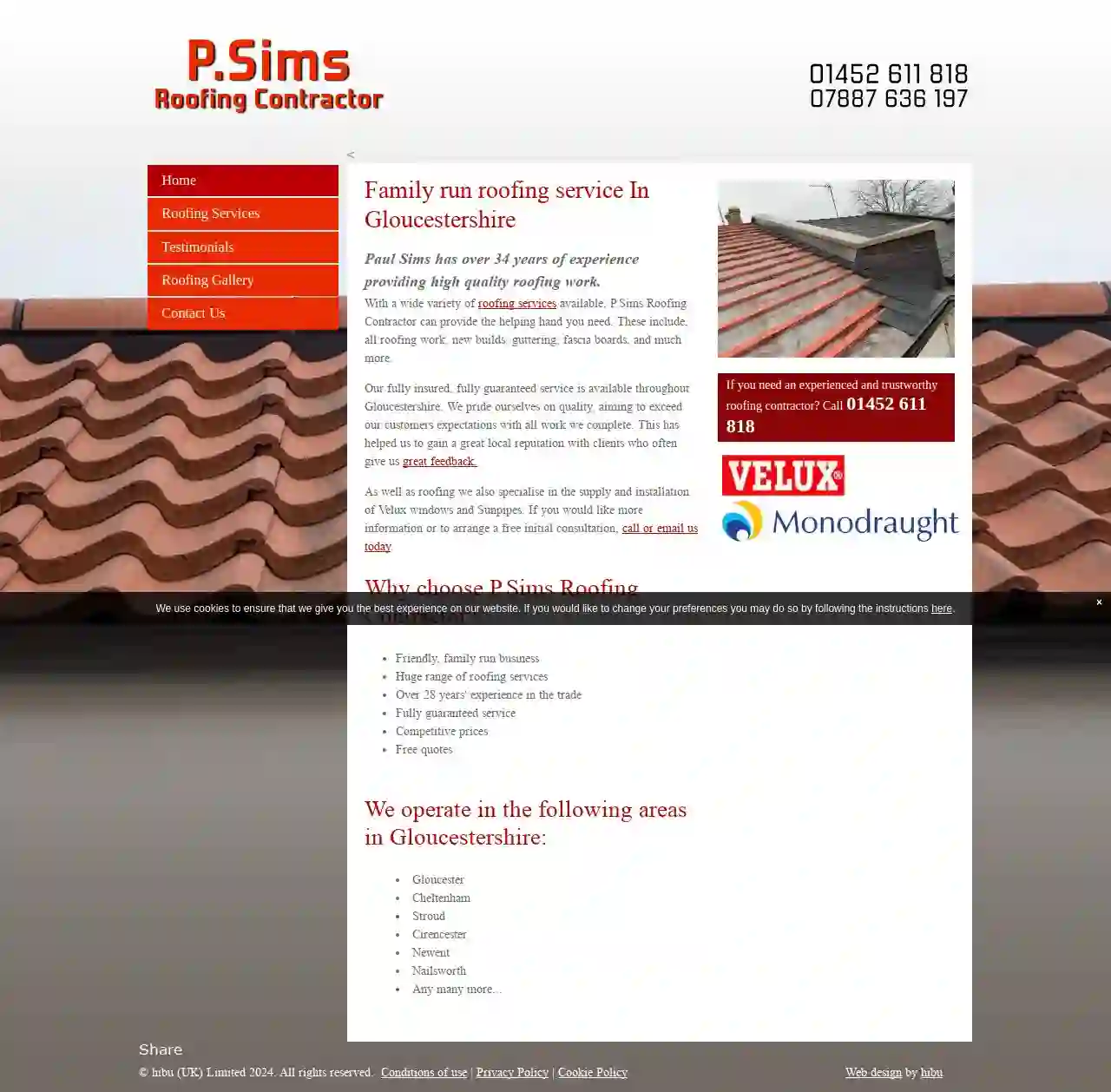
Sims P
52 reviews30 Cheltenham Road, The Lodge, Gloucester, GL2 0LE, GBFamily run roofing service In Gloucestershire Paul Sims has over 34 years of experience providing high quality roofing work. With a wide variety of roofing services available, P.Sims Roofing Contractor can provide the helping hand you need. These include, all roofing work, new builds, guttering, fascia boards, and much more. Our fully insured, fully guaranteed service is available throughout Gloucestershire. We pride ourselves on quality, aiming to exceed our customers expectations with all work we complete. This has helped us to gain a great local reputation with clients who often give us great feedback. As well as roofing we also specialise in the supply and installation of Velux windows and Sunpipes. If you would like more information or to arrange a free initial consultation, call or email us today. Why choose P.Sims Roofing Contractor? Friendly, family run business Huge range of roofing services Over 28 years' experience in the trade Fully guaranteed service Competitive prices Free quotes We operate in the following areas in Gloucestershire: Gloucester Cheltenham Stroud Cirencester Newent Nailsworth Any many more...
- Services
- Why Us?
- Our Team
- Testimonials
- Gallery
Get Quote
Roofing and Building Solutions
4.948 reviews47 The Willows, Gloucester, GL2 9AH, GBWelcome to Roofing and Building Solutions, an award-winning roofer in Gloucester. As a leading, local family-run business, we are proud to offer the full range of roofing services, all with the ethos of delivering an exceptional service at the best value possible. With over 20 years of experience, we provide a professional, trusted, and reliable service, specialising in all aspects of roofing at competitive rates. We are proud to be associated with Checkatrade, MyBuilder, Rated People, FindaTrade, BookaBuilder, and Consumer Rights. Based in Gloucester, we cover all of Gloucestershire. Our team is dedicated to providing top-quality services, with every project completed on time to the agreed price. We offer a national contractor service for local contractor prices, giving you excellent value for money. Our team is fully employed, and we have a fully dedicated team prepared to quote within 48 hours. At Roofing and Building Solutions, we pride ourselves on quality roofing services. Whether a minor repair or a full re-roofing is required, we guarantee the highest quality workmanship at attractive and affordable prices. We offer a range of services, including flat roofing, GRP roofing, EPDM rubber roofing, roofing repairs, fascias and soffits, and more. Our team is fully trained, and we have over 20 years of experience offering domestic and commercial customers a wide variety of roofing services. Get in touch with us today to learn more about our services and how we can help you with your roofing needs.
- Services
- Why Us?
- Accreditations
- Gallery
Get Quote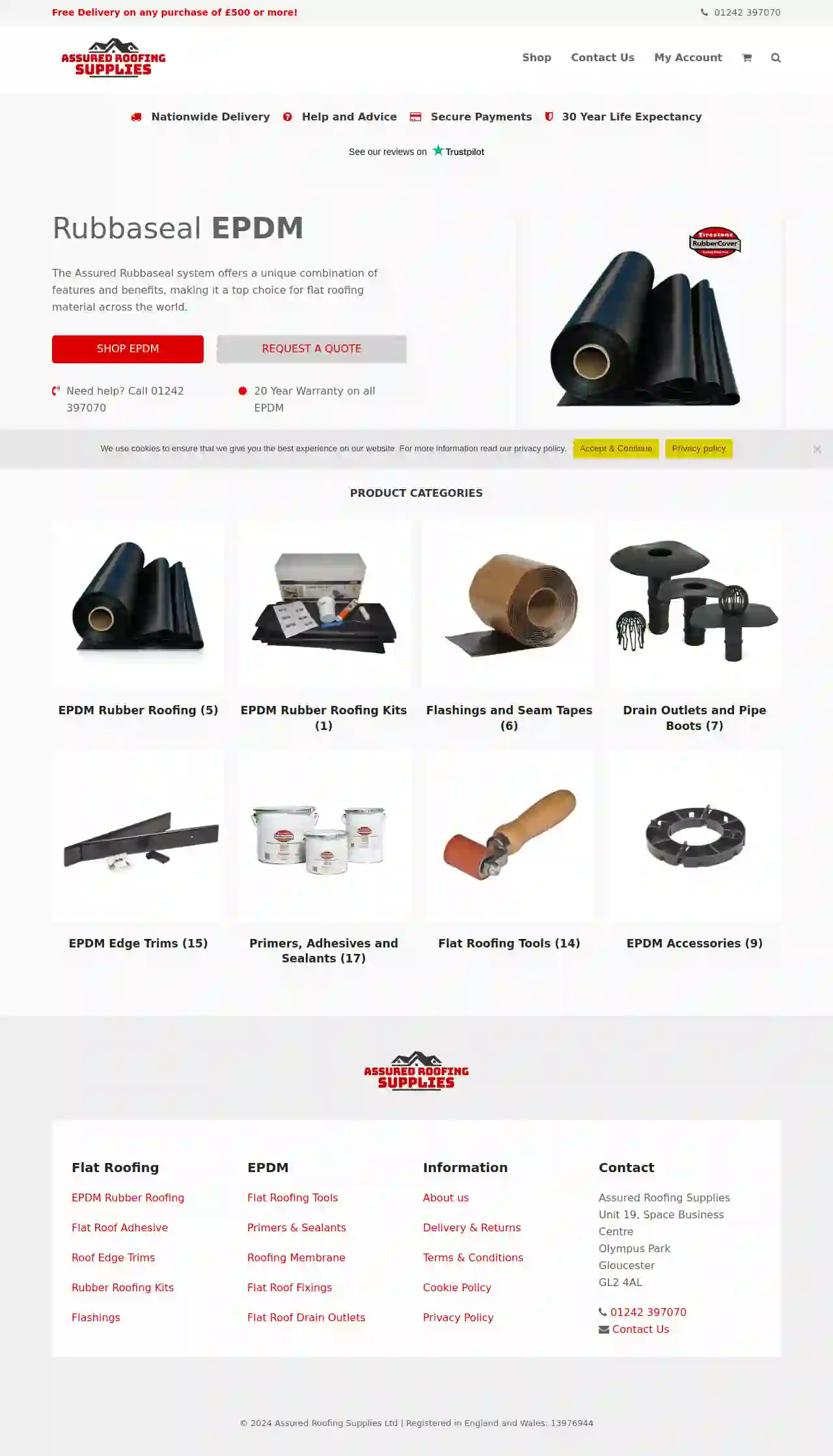
Assured Roofing Supplies
Olympus Park, Unit 19, Space Business Centre, Gloucester, GL2 4AL, GBAssured Roofing Supplies is a leading supplier of high-quality EPDM rubber roofing materials and accessories. With a commitment to providing exceptional customer service and competitive pricing, we have become a trusted partner for roofing contractors and DIY enthusiasts alike. Our extensive range of products includes EPDM rubber roofing membranes, kits, edge trims, flashings, seam tapes, primers, adhesives, sealants, flat roofing tools, drain outlets, and pipe boots. We offer nationwide delivery and a 20-year warranty on all EPDM products. At Assured Roofing Supplies, we understand the importance of a durable and reliable roofing system. That's why we source our products from reputable manufacturers and rigorously test them to ensure they meet the highest industry standards. Our team of experienced professionals is always on hand to provide expert advice and support, helping you choose the right products for your specific needs. Whether you're undertaking a small DIY project or a large-scale commercial installation, Assured Roofing Supplies has the expertise and resources to help you succeed. Contact us today to learn more about our products and services.
- Services
- Why Us?
- Gallery
Get Quote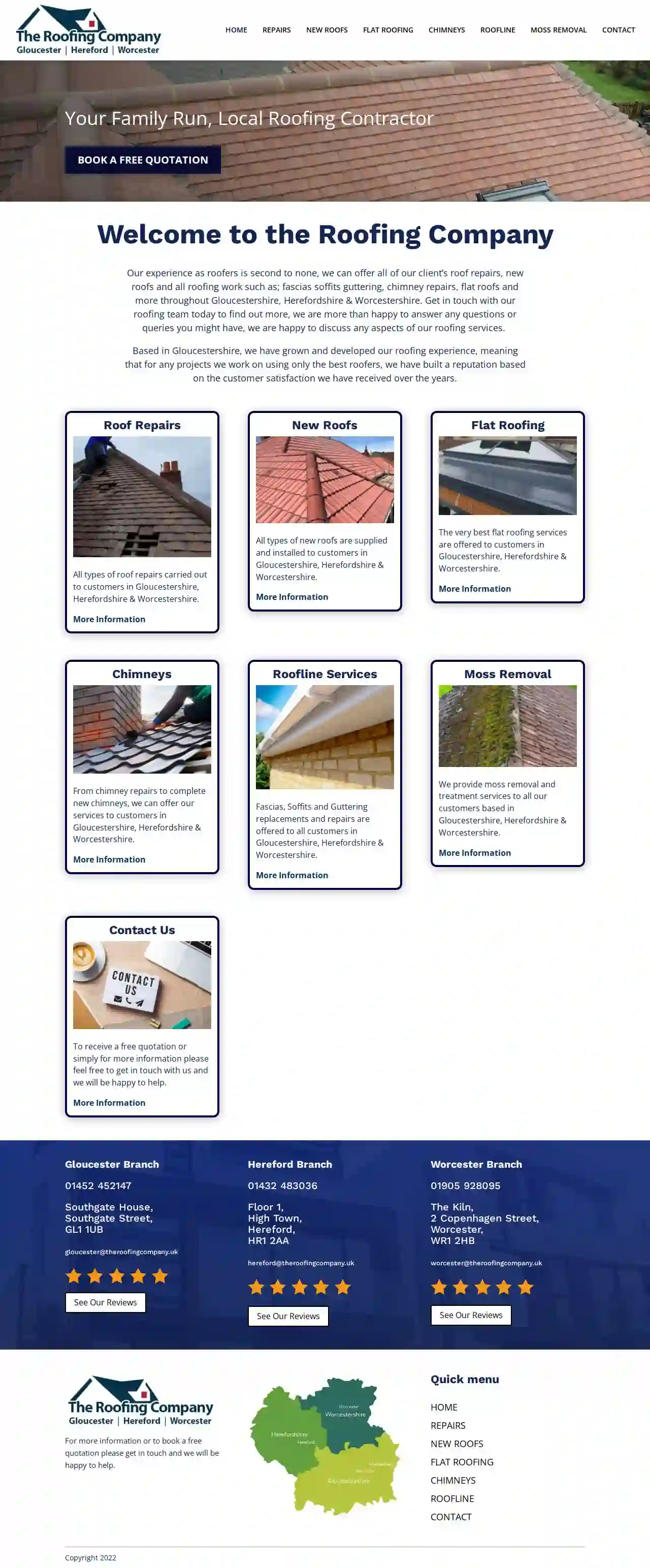
The Roofing Company Gloucester
56 reviewsSouthgate House, Southgate Street, Gloucester, GL1 1UB, GBYour Family Run, Local Roofing Contractor Welcome to the Roofing Company Our experience as roofers is second to none, we can offer all of our client’s roof repairs, new roofs and all roofing work such as; fascias soffits guttering, chimney repairs, flat roofs and more throughout Gloucestershire, Herefordshire & Worcestershire. Get in touch with our roofing team today to find out more, we are more than happy to answer any questions or queries you might have, we are happy to discuss any aspects of our roofing services. Based in Gloucestershire, we have grown and developed our roofing experience, meaning that for any projects we work on using only the best roofers, we have built a reputation based on the customer satisfaction we have received over the years. Roof Repairs All types of roof repairs carried out to customers in Gloucestershire, Herefordshire & Worcestershire. New Roofs All types of new roofs are supplied and installed to customers in Gloucestershire, Herefordshire & Worcestershire. Flat Roofing The very best flat roofing services are offered to customers in Gloucestershire, Herefordshire & Worcestershire. Chimneys From chimney repairs to complete new chimneys, we can offer our services to customers in Gloucestershire, Herefordshire & Worcestershire. Roofline Services Fascias, Soffits and Guttering replacements and repairs are offered to all customers in Gloucestershire, Herefordshire & Worcestershire. Moss Removal We provide moss removal and treatment services to all our customers based in Gloucestershire, Herefordshire & Worcestershire. Contact Us To receive a free quotation or simply for more information please feel free to get in touch with us and we will be happy to help.
- Services
- Why Us?
- Gallery
Get Quote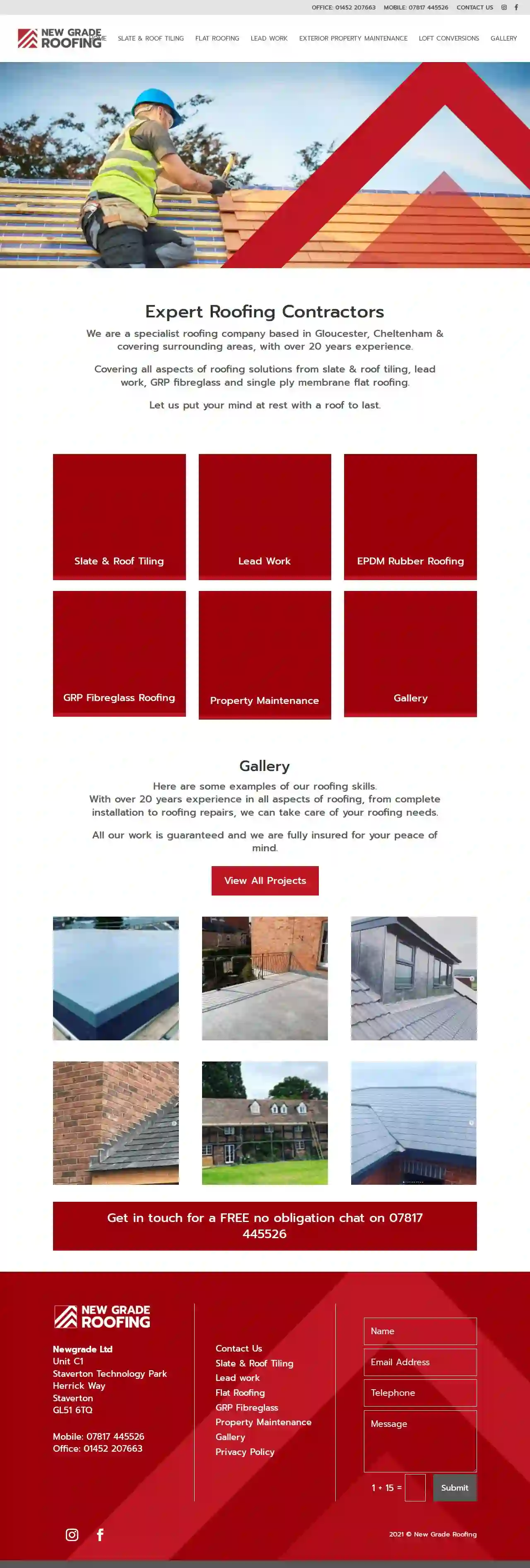
Newgrade Ltd
Herrick Way, Staverton, Unit C1Staverton Technology Park, GL51 6TQ, GBWe are a specialist roofing company based in Gloucester, Cheltenham & covering surrounding areas, with over 20 years experience. Covering all aspects of roofing solutions from slate & roof tiling, lead work, GRP fibreglass and single ply membrane flat roofing. Let us put your mind at rest with a roof to last. With over 20 years experience in all aspects of roofing, from complete installation to roofing repairs, we can take care of your roofing needs. All our work is guaranteed and we are fully insured for your peace of mind.
- Services
- Why Us?
- Gallery
Get Quote
LIAM TAYLOR Repointing & Roofing Services
59 reviewsGloucester, GBLiam Taylor Repointing & Roofing Services is a family-run business based in Gloucester, proudly serving all areas of Gloucestershire. We specialize in providing expert repointing, roofing, and property maintenance services to residential clients. Our team has extensive experience completing projects of all sizes, from small repairs to full re-roofing. We are committed to delivering high-quality workmanship and exceptional customer service. We cover a wide range of areas including Cheltenham, Gloucester, Ledbury, Newent, Redmarley D'Abitot, Ross on Wye, Hucclecote, Longlevens, Churchdown, Up Hatherley, Warden Hill, Prestbury, Bishops Cleeve, Stroud, Dursley, and Winchcombe. Get in touch today for a free consultation and quote.
- Services
- Why Us?
- Gallery
Get Quote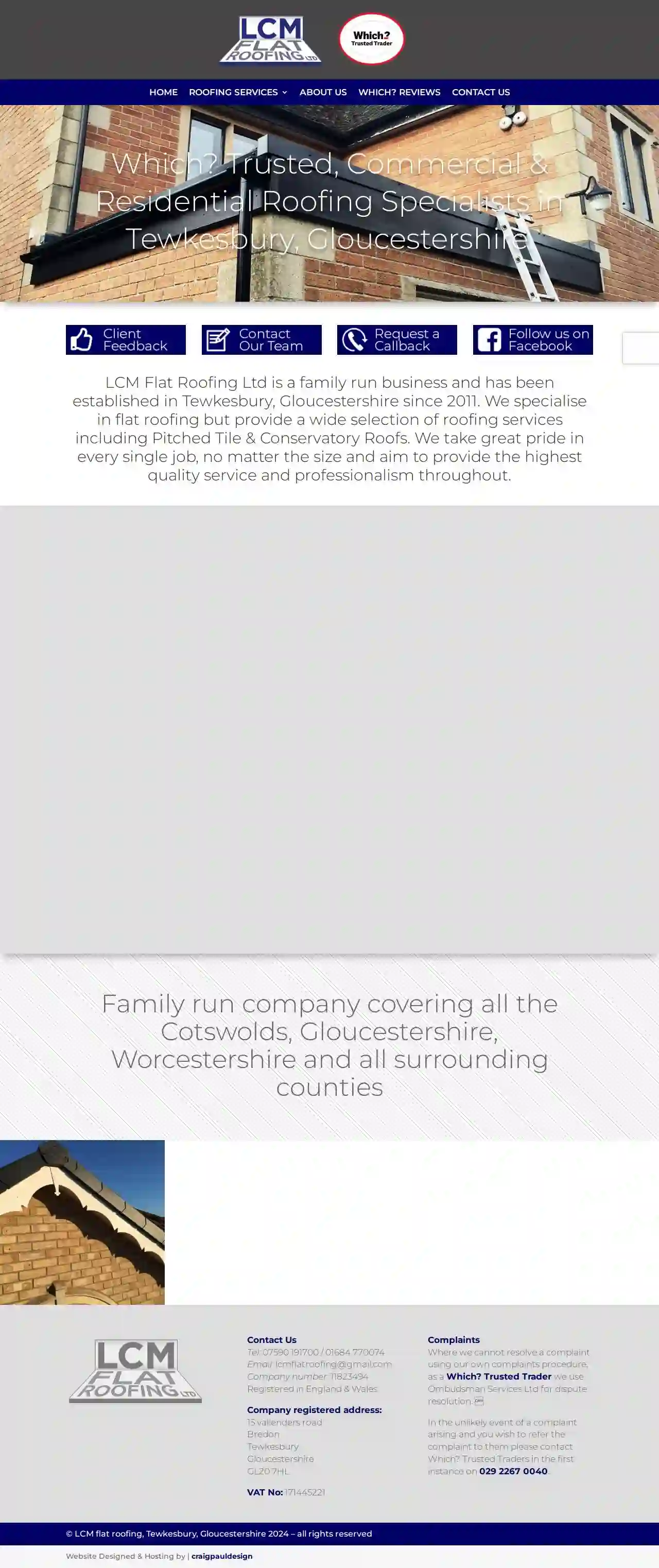
LCM Flat Roofing
4.25 reviewsGloucester, GB- Services
- Why Us?
- Gallery
Get Quote
Over 12,314+ Roofing Companies registered
Our roofing experts operate in Bourton on the Water and beyond!
Roofyng.co.uk has curated and vetted Top Roofing Contractors in and around Bourton on the Water. Find a reliable contractor today.
Frequently Asked Questions About Roofing Companies
- Home Improvement Loans: Offered by banks or credit unions.
- Home Equity Loans or Lines of Credit: Use your home's equity as collateral.
- Government Programs: Check for energy efficiency rebates or grants.
- Contractor Financing: Some roofing companies offer financing plans.
- Asphalt Shingles: Popular, affordable, available in various styles (3-tab, architectural, etc.)
- Metal Roofing: Durable, long-lasting, energy-efficient, available in panels, shingles, or tiles.
- Tile Roofing: Clay, concrete, or slate; known for longevity, durability, and aesthetic appeal.
- Flat Roofing: EPDM rubber, TPO, PVC, modified bitumen, or built-up roofing (BUR).
- Slate: Natural stone, extremely durable, expensive, requires expert installation.
- Wood Shakes or Shingles: Natural wood, aesthetically pleasing, requires regular maintenance.
How can I get financing for a new roof?
What are the different types of roofing materials?
What is a roof valley, and why is it important?
How often should I clean my gutters?
How can I get financing for a new roof?
- Home Improvement Loans: Offered by banks or credit unions.
- Home Equity Loans or Lines of Credit: Use your home's equity as collateral.
- Government Programs: Check for energy efficiency rebates or grants.
- Contractor Financing: Some roofing companies offer financing plans.
What are the different types of roofing materials?
- Asphalt Shingles: Popular, affordable, available in various styles (3-tab, architectural, etc.)
- Metal Roofing: Durable, long-lasting, energy-efficient, available in panels, shingles, or tiles.
- Tile Roofing: Clay, concrete, or slate; known for longevity, durability, and aesthetic appeal.
- Flat Roofing: EPDM rubber, TPO, PVC, modified bitumen, or built-up roofing (BUR).
- Slate: Natural stone, extremely durable, expensive, requires expert installation.
- Wood Shakes or Shingles: Natural wood, aesthetically pleasing, requires regular maintenance.